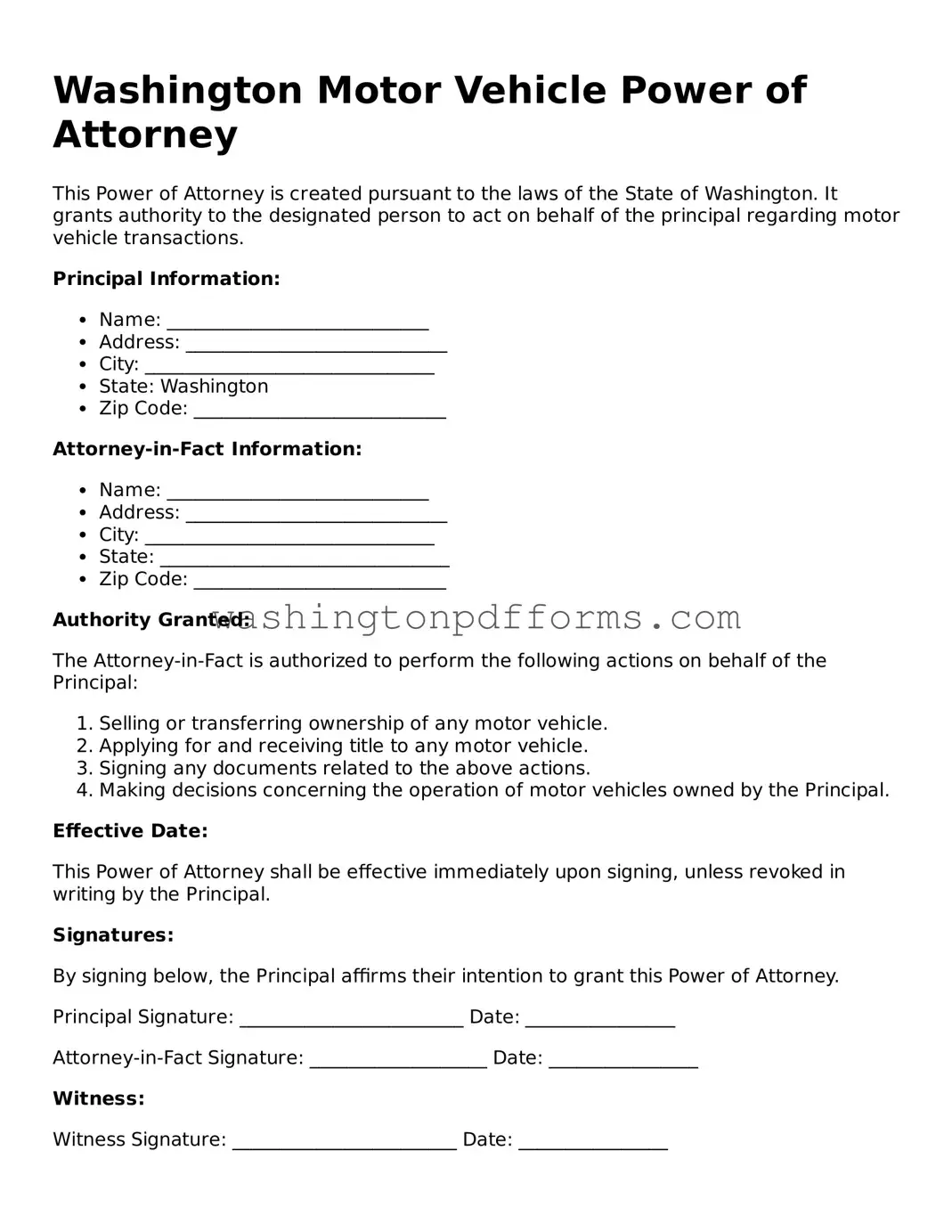Attorney-Approved Washington Motor Vehicle Power of Attorney Template
When it comes to managing motor vehicle transactions in Washington State, the Motor Vehicle Power of Attorney form is an essential tool. This document empowers an individual, known as the agent, to act on behalf of the vehicle owner, or principal, in various matters related to their vehicle. Whether it’s signing title transfers, registering a vehicle, or handling other related paperwork, this form simplifies the process and ensures that the agent can legally represent the owner’s interests. Notably, the form requires specific information, such as the names and addresses of both the principal and the agent, as well as details about the vehicle in question. Additionally, it’s important to note that the power granted can be limited to certain tasks or be more comprehensive, depending on the needs of the vehicle owner. Understanding the nuances of this form can make a significant difference in efficiently managing vehicle-related responsibilities.
Common mistakes
Filling out the Washington Motor Vehicle Power of Attorney form can be straightforward, but many individuals encounter common mistakes that can lead to delays or complications. One frequent error is failing to provide complete information. Each section of the form must be filled out accurately. Omitting details, such as the vehicle's VIN or the principal's contact information, can invalidate the document.
Another mistake involves not signing the form correctly. The principal must sign the form in the designated area. If the signature is missing or does not match the name printed on the form, it may not be accepted by the Department of Licensing. Additionally, witnesses or notarization may be required, depending on the specific circumstances. Neglecting this step can render the power of attorney ineffective.
People often overlook the importance of designating the correct agent. The agent is the person authorized to act on behalf of the principal regarding the vehicle. If the agent's name is misspelled or if a person who is not legally able to serve is chosen, it can create confusion and legal challenges. Ensuring that the agent is trustworthy and capable of handling the responsibilities is essential.
Finally, misunderstanding the scope of authority granted is a common issue. The form allows the principal to specify what powers are being given to the agent. If the principal does not clearly outline these powers, the agent may not be able to perform necessary tasks related to the vehicle. It is crucial to review the options carefully and ensure that the form reflects the principal's intentions accurately.
Similar forms
- General Power of Attorney: This document allows one person to act on behalf of another in a variety of matters, including financial and legal decisions. Like the Motor Vehicle Power of Attorney, it grants authority to manage specific tasks.
- Durable Power of Attorney: Similar to a general power of attorney, this document remains effective even if the principal becomes incapacitated. It often includes provisions for managing vehicles and other assets.
- Limited Power of Attorney: This form restricts the agent's authority to specific tasks or a limited timeframe. It can be used for vehicle transactions, much like the Motor Vehicle Power of Attorney.
- ATV Bill of Sale: To ensure a smooth transaction, the essential ATV Bill of Sale form guide serves as a crucial resource for documenting the sale of your all-terrain vehicle.
- Vehicle Title Transfer Form: This document is used to officially transfer ownership of a vehicle. While it does not grant authority, it often accompanies a power of attorney when someone else is handling the transfer.
- Bill of Sale: A bill of sale documents the sale of a vehicle. It often works in conjunction with a power of attorney when the seller cannot be present during the transaction.
- Release of Liability Form: This form protects the seller from future liabilities after selling a vehicle. It may be used alongside a power of attorney to ensure the new owner assumes responsibility.
- Vehicle Registration Application: This document registers a vehicle with the state. An agent can submit this application using a power of attorney, ensuring compliance with local laws.
- Insurance Policy Assignment: This document allows one person to assign their insurance benefits to another. It can be related to vehicle ownership and is often used in conjunction with a power of attorney.
- Loan Agreement: When financing a vehicle, a loan agreement outlines the terms. A power of attorney may be necessary if someone else is signing on behalf of the borrower.
- Affidavit of Heirship: This document establishes the rightful heirs to a vehicle after someone's passing. It may require a power of attorney if the heirs need to act on behalf of the estate.
Some Other Washington Templates
How to Do a Bill of Sale - This document might include a clause for AS-IS sales, indicating no guarantees are made.
Before you proceed with the transfer, it's important to gather all necessary documentation, including the Boat Bill of Sale form, which will help confirm the details of the transaction and ensure that both parties have a clear understanding of the agreement.
Washington Lease Agreement Pdf - It specifies any rights related to early lease termination due to military service.
